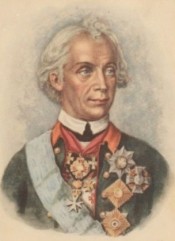
Presidential Library dedicated to 295th anniversary of great commander Alexander Suvorov
On November 24, we mark the 295th (according to some sources - 294th) anniversary of the birth of Alexander Suvorov (1729-1800), one of the most prominent military leaders in Russian and world history. Starting as a guard soldier, he rose to the rank of generalissimo and participated in seven major wars, winning more than sixty battles without a single defeat. He was awarded all of the famous Russian military orders of his time, including the Order of St. George, the highest honor for military valor.
However, not many people know that it was Alexander's great-grandfather who first recognized his talent for military leadership. Pushkin, who was also a great admirer of Suvorov, was the one who presented him with his first official award - a ruble - from Empress Elizabeth Petrovna.
Alexander Suvorov's father, Vasily Ivanovich, was a godson of Peter the Great and considered one of the most educated men of his time. Seeing his weak and sick son, he did not think he had the potential for a successful military career and believed he should become an official instead. There was a great library in the house and thanks to his "intelligence, memory, and passion for reading", at the age of 11, Sasha knew more than many adults. The propensity for military service, as Russian military figure Alexander Geraua writes in his book Suvorov the Soldier (1900), was "expressed in the boy in the most vivid way". He spent his free time reading books on military topics that he had at hand. This was not just idle curiosity: he laid out geographical maps, armed with a pencil and paper, and drew up battle plans himself, followed the movements of imaginary troops, and made marks on the maps.. He read the pages about military achievements dozens of times, imagining his own heroic deeds.
But the dream might not have come true if it weren't for the intervention of General-in-Chief Abram Hannibal, Pushkin's great-grandfather. He was the same "Peter the Great's Arap", who, like Vasily Suvorov, was a godson of the first Russian emperor.
When visiting the Suvorov family, Hannibal often noticed that his friend's son rarely went out to meet guests, was shy with strangers, and generally presented himself as a strange and mysterious boy. In the book Biography of Field Marshal and Generalissimo Prince Alexander Vasilyevich Italiysky, Count Suvorov-Rymniksky, there is an episode where Vasily Ivanovich told Abram Petrovich about his son's hobbies and complained about his lack of social skills..
But theory is one thing, and physical training is another. Alexander understood this well. He had a strong character and incredible will, and his sickly body was not an obstacle to realizing his dream.
From childhood, Suvorov had a love for a simple, harsh life, which he lived until his death. As a child, he would sometimes stay in the rain or cold for hours, and to the admonishments of loved ones, he would usually reply that a soldier is not supposed to be pampered or get used to luxury.
There was nothing superfluous in Suvorov's childhood room: a wooden bed with a hard mattress, a leather pillow, a large, simple table, and several oak chairs. This was how Nikolai Teleshev described Suvorov in his book Alexander Suvorov: His Life and Deeds published in 1900.
At the age of 12, Suvorov joined the Semyonov Guards Regiment as a private. For the next three years, he lived under his parents' roof, but in his sixteenth year, he decided that it was time for him to learn military skills in practice and joined the army.
While his peers saw soldier training and military exercises as fun, Suvorov wanted to experience the full weight of soldiering, getting to know the Russian soldiers as closely as possible. He wanted to understand their character, needs, and learn their language. As reported in the book An Essay With a Portrait. Suvorov's Autograph and Drawings (1916) Suvorov's goal was to become a great general and lead his troops to victory..
For more than eight years, Suvorov served as a humble soldier. He lived in the barracks with his fellow soldiers, working as an artist and friend. He never missed a drill, always cleaning his gun and participating in daily activities. He was no different from any other soldier, and he did not burden himself with any official duties.
The personality of the commander, his character traits and habits, are revealed in the 1808 edition of The Spirit of the Great Suvorov: Authentic Anecdotes About Prince Alexander Suvorov-Rymniksky. This book includes, among other things, Suvorov's unique correspondence, including letters from Catherine the Great, Paul I, and the rulers of Germany, Prussia and Poland. One of these messages reflects the generalissimo's view on the qualities that a true military leader should possess.
The authors of Alexander Suvorov: His Life and Military Exploits with Anecdotes and His Apt Words (1900), note that detailed knowledge of all aspects of military service was the key to the generalissimo's love from his subordinates.
On the portal of the Presidential Library, users can explore a collection dedicated to the life and military career of Alexander Suvorov. The selection includes digital copies of rare publications from the 19th and 20th centuries, collections of documents and research, as well as visual and audio materials. Among the valuable publications are portraits of the Generalissimo, views of his residence, and photographs of the statue of the commander in the form of the Greek god of war, Mars, on Suvorovskaya Square in St. Petersburg, which was designed and approved during his lifetime. Additionally, visitors can view for the first time in Russian history a specially built museum dedicated to commemorating the achievements of one individual - Alexander Suvorov.

